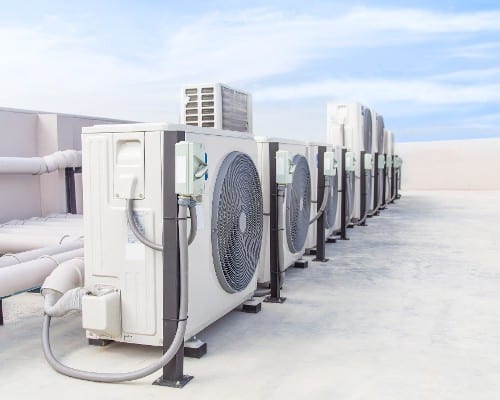Are you considering upgrading your current heating and cooling system? If so, then you’re in the right place. At River Valley Air Conditioning, Inc., we understand how important it is to make sure that your home is comfortable and energy efficient.
That’s why we’ve compiled this list of considerations for anyone looking to get HVAC upgrades. We want to help homeowners make informed decisions that will best suit their needs and their budget.
This post will look at the benefits of upgrades, and some things to consider before upgrading so you can feel confident in your choice and get the most out of your next HVAC system.
Benefits of HVAC upgrades
Replacing your old HVAC system with a new model lets you benefit from upgraded air conditioning, better comfort, increased efficiency and more.
- Improved comfort and air quality: By upgrading an existing system and investing in a new one for a more efficient solution, homeowners can enjoy climate-controlled rooms with consistent temperatures so there’s never too much or too little coolness indoors.
Newer HVAC systems can also help maintain good indoor air quality while eliminating particles like dust and pollen that may otherwise cause allergies and other health concerns.
- Better energy efficiency: Upgrading a home’s heating and cooling system with Energy Star-rated equipment can make a big difference in energy conservation. By replacing an old, inefficient model, homeowners in Arizona can save up to 20% on their utility bills.
Modern systems are more efficient – reducing wasted energy by up to 60%. Less electricity used, means a significant decrease in your monthly bills.
- Longer lifespan: Upgrading an existing unit may increase its lifespan while delivering better performance. Newer systems often equal better efficiency and more savings as a result.
By investing in an HVAC upgrade, you can enjoy all of these benefits and more. However, a new system can be costly, so it’s important to consider several factors before making your purchase.
Considerations Before Getting an HVAC Upgrade
Before upgrading your existing HVAC system, it’s important to take into account factors such as future needs, space availability, warranty options and budget considerations.
1. The age of your existing unit
When considering whether to get an HVAC upgrade, the age of your existing unit is crucial. The typical lifespan of a residential HVAC system spans from 10-25, depending on usage and maintenance.
When making the decision to upgrade or not, considering your current system’s age and condition is crucial. Repair costs could become necessary soon enough and could force an upgrade.
2. Budget
Before getting a system upgrade, homeowners should carefully plan their budgets to assess what they can afford and what they need for the upgrade. Make sure to leave room for extra expenses not accounted for in the initial budget planning.
It’s important to adequately research and consider all costs related to a potential upgrade before committing. This includes factoring in any tax credits, rebates, or warranties available on certain products, which could potentially reduce the overall cost of installation & repair services.
Additionally, an aging HVAC system may start eating up extra energy so it may actually be worth it to replace your unit instead of continuously repairing it.
3. Consider How Much Space You Have for the New HVAC Unit
When it comes to HVAC upgrades, considering the size and layout of the space is essential. If a current system is too small for the size of the space, upgrading to one that’s larger will allow for more efficient heating and cooling.
Depending on how much room there is in the area, ductwork may have to be reconfigured or modified during an upgrade process as well. In addition, mini-split systems may be a more suitable alternative in smaller spaces or areas with specific heating needs since they don’t require extensive ductwork installation like traditional HVAC systems do.
Consult a technician to help you get the best-sized unit. Under sizing can lead to inefficient performance, while oversizing lowers ventilation quality and leads to higher energy costs.
4. Is Your New System Compatible With Your Current Home System?
Another key consideration for HVAC system upgrades is system compatibility. Ensure any new unit you consider works well with any of your existing systems or equipment such as your thermostat, ductwork or ventilation systems.
Also consider how this new system could potentially alter other home systems. An energy-efficient HVAC unit could mean upgrades to the electrical infrastructure in your home.
Consideration of all these factors is key when it comes to selecting the ideal system for both your home and budget. At River Valley Air Conditioning, Inc., our team of specialists is here to help you ensure everything in your home is compatible and up-to-date.
5. Future HVAC needs
When considering installing a new HVAC system, factor in your home’s future needs. Over time, a family’s size may change and the layout of the home may evolve as technology advances.
Having an experienced contractor select an updated system for you could improve your indoor air quality and offer you enhanced energy savings capabilities too.
By investing in an efficient heating and cooling system now and taking advantage of long-term cost savings and improved comfort levels, you can ensure that your HVAC system is up-to-date and serves you well for years to come.
6. Consider Relevant Tax Credits or Upgrades
When upgrading an HVAC system, keep in mind relevant tax credits and incentives. You could potentially qualify for local, state, and federal rebates and credits that can help offset some of the expenses of upgrading and make it more affordable.
Researching energy-efficient HVAC systems that could qualify you for additional tax credits and incentives can also be worthwhile. ENERGY STAR products, for instance which use less energy while improving performance and often have tax advantages.
River Valley Air Conditioning, Inc.’s goal is to make HVAC upgrades as cost-effective as possible for our clients, so we stay abreast with the current tax credits and incentives to get maximum savings on upgrades. Our technicians are up-to-date on the available tax credits so that they can provide recommendations tailored specifically to your home and budget.
Upgrading Your HVAC System? Let River Valley Help.
We hope this article has helped give you a baseline to make an informed decision on your new upgrade. Before installing a brand new unit, assess and evaluate your future needs, available space requirements for a new unit, the age of your existing unit, its performance and your budget.
Here at River Valley Air Conditioning, our goal is to provide our customers with the best possible service and solutions to their needs. Our team is available to answer any inquiries on upgrades, tax credits and rebate programs. Book an appointment today, and let us help you build your dream home.

